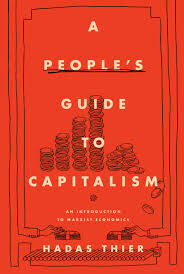Modern economics is supposedly the pinnacle of the social sciences, a discipline of grandiose scope able to exhaustively explain the complex workings of capitalism and direct its development toward ever-greater degrees of rationality and efficiency. Economists appear as the great stewards of an activity as old as humanity itself—exchange between two equal parties. Through a preoccupation with price analysis, the intricacies of supply and demand, and complex systems modeling, they attempt to uncover the self-evident laws inherent in this timeless activity. All external considerations, however, vanish the instant that two individual wills meet in the market to make an exchange at once equal and mutually beneficial. As the Mises Institute, a libertarian think-tank, argues: “Economics at its core is about human actions … It’s about our individual wants, needs, and abilities. And it’s about how we interact with others to benefit each other and build the society around us.”
As it happens, many people—unless they have the dubious privilege of being a Jeff Bezos or Bill Gates—have gained ample reason in the last few decades to distrust the self-description of economics, as levels of inequality have grown astronomically and as economic crises occur with increasing frequency. Whether it is the absolute economic devastation wrought by the Great Recession, the worsening climate crisis, or the botched handling of the coronavirus pandemic, the inability of economics to explain the anarchic nature of its own discipline is apparent. If capitalism is so rational and efficient, why does it fail so often and so hard? Why does it not make good on its promise to meet the demands of consumers, as thousands in cities go homeless while luxury apartments sit empty across the street? Is this merely a question of employing appropriate policy or measures of technocratic management, or do these reformist solutions fail to demystify what actually goes on under capitalism? Moral denunciations of the evils wrought by capitalism can only take us so far. What is needed is a solid foundation upon which to investigate the how and why of the capitalist economy.
It is here that Karl Marx’s theoretical project of the “critique of political economy” enters as an indispensable guide to understanding the inner workings of the capitalist mode of production and the myopia of mainstream economics. This is the subject of Hadas Thier’s new book, A People’s Guide to Capitalism: An Introduction to Marxist Economics (Haymarket), which succeeds in presenting Marx’s argument in Capital (mostly volumes 1 and 3) in a succinct and accessible manner. Although the book’s narrow focus misses out on some of the broader features of Marx’s mature thought—there is no discussion, for example, of how Capital relates to Marx’s crucial dialectical method, nor is there much connection to how Marx’s ideas relate to his ultimate communist horizon—the book gives the reader a solid handle on the fundamentals of Marx’s critical ideas about political economy. A People’s Guide to Capitalism is a timely resource for those looking for an entry point into Marxist thought. Especially relevant are its numerous “sidebars,” which use Marx’s insights to make sense of contemporary subjects like bitcoin, theories of mainstream economics, the housing crisis, financial capital, and the coronavirus.
Thier’s goal is to help us demystify the unassailable realm of the dismal science, so that we might better challenge it. But this entails going beyond the reductionistic parameters set by mainstream economics itself. For as Thier writes, “Marx was more interested in uncovering the underlying dynamics of capitalism: what drives value, how it is produced, and for whom.” These underlying dynamics take us to the heart of the mechanisms of capitalist inequality; they show us what capitalism is compelled to do, just as they prompt strategies of conceiving and fighting for more just alternatives.
In highlighting these questions—the what, the how, and the for whom—Thier points us to what Marx meant by the critique of political economy. The long tradition of “bourgeois” political economy, stretching back to Adam Smith, is a self-apologia of the capitalist class. This class is unable to see or accept the contradictions of capitalism precisely because it views itself and its activity as a natural and ahistorical phenomenon. The economy appears as a ready-made, sophisticated game between equal players, who compete for the best shares of a continually self-expanding whole. But capitalism, Thier writes, “is not simply an economic or a political structure, but a system of social relationships”—relationships which have a definite beginning in history, and which assume a particular material form. Under capitalism, there are those who own and control the means of producing things and there are those who do the producing. While plenty of variance and fluidity may exist within the class makeup of society, this basic division between bourgeoisie and proletariat holds in the grand scheme of the economy, because these classes are reflective of our relationship to the levers of economic power.
For Marx, then, the critique of political economy operates simultaneously on two levels—on the one hand, it covertly inhabits the world of appearance that bourgeois economy itself constructs, in order to expose its mystifications from the inside—for instance, how money, commodities, and markets seem to act of their own volition, or how we seem to enter the market as free individuals. On the other hand, Marx’s critique steps outside the system to lay bare the historical and material realities which sustain the appearances, how the exploitation which drives capitalism takes place “behind the backs” of workers.
To unmask these appearances, we must, to use Marx’s ominous phrase, leave the market and enter “the hidden abode of production on whose threshold there hangs the notice ‘No admittance except on business.’” Thier is particularly lucid in explaining Marx’s foray into this realm, which holds the “secret” to capitalist profits—the exploitation of that “special commodity of labor-power,” our “ability to work.” This is where the fundamental insight of Marx’s theory is driven home—that capitalism vampirically drains “surplus value” out of the productive activity of workers:
“Workers’ lack of control over the means of production makes us dependent on capital. We are coerced by the threat of poverty to sell the only commodity we have: our labor-power. Within the ‘hidden abode of production’ our labor then produces more value than our labor-power costs in wages, adding extra value to the final product that the capitalist does not pay for in his initial investment.”
It is not a question of good capitalists versus bad capitalists, or of democratic capitalism versus “crony capitalism.” Instead, this is the recognition that under capitalism—as it functions “normally”—the owners of capital are compelled to exploit workers for the express purpose of generating limitless profits. And workers are compelled to play the game, by rules they did not set, or suffer horrible consequences.
Though it is a system for producing useful things, capitalism doesn’t actually care about the usefulness of what it produces (see “Amazon warehouses trash millions of unsold products”)—or what Marx called a commodity’s “use-value.” To be sure, capitalists must sell their commodities, and thus are obliged to produce for some degree of utility. But this is—and must be—a secondary concern for the capitalist, who ultimately wants to generate more “exchange-value” for a commodity than what was originally invested to produce it. Unlike in pre-capitalist societies, capitalists aim to produce use-values, not for the fulfillment of human need, but in order to continually expand value in the form of profit.
The capitalist’s formula for this process is Money-Commodity-Money Plus (M-C-M’)—an alchemy which has, Marx quipped, all the “charms of a creation out of nothing.” But behind this appearance is a reality of exploitation of real people, of the added value for the capitalist that is extracted out of labor. Crucially, capital is driven to pursue this circuit indefinitely; it’s not as if billionaires ever decide that they have amassed enough billions. In fact, M-C-M’, Thier explains, “cannot be a linear process with a beginning and end, but a continuous one, which must spiral in growth.” This irrational impulse towards unlimited growth, coupled with an ever-tightening grip on labor power (increasing productivity, lower wages, constant improvement of technology, more market-controlled spaces), is what drives the recurrent crises of capitalism. Crisis is not an anomaly but is central to the capitalist system. This apparent amorality—one that masks a deeper injustice, the ruthless domination of one class over another—means that capitalism in any form is by nature unable to further human flourishing.
Value is an important concept in Marx, because value, as a social construction, is what ultimately drives economies. Unlike later neoclassical and modern economists—who search for value in market prices or subjectivity—Marx built on the classical economists Adam Smith and David Ricardo to locate the essence of capitalist value in labor. This “labor theory of value”—or what has been alternatively titled a “value theory of labor”—has been widely disparaged by mainstream economics for being outmoded and simplistic. But the question of value takes us back to Marx’s twofold critique of political economy. On the one hand, bourgeois economy cannot see the real meaning of value because it does not see class relations in its abstract, fetishized understanding of the market; on the other, the capitalist class depends on the invalidity of the labor theory of value, because its implications are revolutionary. As Thier observes, “later economists had seen enough militancy and class struggle to fear the radical implications of working-class power.” What would happen if the great mass of people who created an economy’s value actually received the benefits of that labor and were able to direct the development of the economy? Well, we would have socialism.
“Only conventional analysts see economics as numbers,” Thier writes. “Marxists understand economics as being fundamentally about humans and our lives on this planet.” Bourgeois society compels us to act and think in only one way—to maximize value. We are constantly looking for deals, studying the stock market so we don’t starve when we retire, assessing every situation with the calculating eye of a self-interested investor. The irony is that most of us still spend our lives in thrall to invisible CEOs and investors who are getting more value out of us than we receive back.
Capitalist value is a travesty of wealth, which, Marx argued, really originates in labor and nature. Labor, for Marx, is much more than what we normally think of as “work”—although he did have an acute sense of what it means to “toil.” Labor is “form-giving fire,” Marx wrote in the Grundrisse, a dynamic, living force which brings inanimate material to life. Whether it is the fall of a hammer or the stroke of a brush, or the mental effort of crafting poetry, labor is muscle power, brain power, and some might even say spirit moving in the world—transforming it and being transformed by it. Without the constraints of capitalism, the full power of this creative labor could be unleashed; no longer would we produce for the sole purpose of maximizing exchange-value, but simply because creation is at the heart of human activity. It is this expansive view of “economic life” as conceived by Marxism that is one of its great strengths. It also reveals capitalism to be the very thing socialism is criticized for: a vulgar materialism and a reductive economism. As Terry Eagleton writes in Why Marx Was Right:
“It is capitalism which believes in production for production’s sake, in the narrower sense of the word ‘production.’ Marx by contrast, believes in production for its own sake in a more generous sense of the word. He argues that human self-realisation is to be valued as an end in itself, rather than reduced to the instrument of some other goal.”
Thier’s book is a valuable introduction to Marxist concepts which helps us to see how Marxism can be used to deepen our knowledge of capitalism, beyond the level of mere appearance. To remain at the level of appearance is to mistake the essential nature of capitalism for problems of poverty, consumerism and greed. But Marx’s concepts help us locate these problems as outgrowths of capitalism itself. For Christians and other leftists who would seek to build a more robust society of human flourishing, Marx offers a solid foundation for analysis of our world.
But the concepts are only a starting point. The point is to change the world, as Marx wrote, and Thier reminds us that Marxism is a “living breathing theory applied to social relations, which themselves are always in motion.” Our ability to connect Marx’s insights to movements on the ground—in our communities and in anti-capitalist struggles around the world—is the true test of their worth. Ultimately, Marx’s economic theories are an impetus for working people to use the power of their collective labor, the most valuable commodity in capitalism, to disrupt capital’s dominance. Mammon will not lay down its power willingly; more than prophetic denunciations of idolatry, we need the tools to unmask and dismantle the idol.
Daniel Saunders is a designer and writer living in Los Angeles. His research interests include Marxist theory and liberationist Christianity. You can find him on Twitter @dothedan




